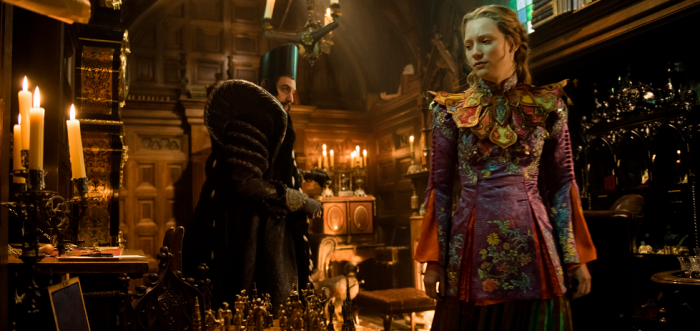
By any measure of prevailing “taste,” Tim Burton’s Alice In Wonderland appears to have been widely disliked — except, presumably, by more than a billion dollars worth of global ticket buyers, and thus Disney shareholders, who weren’t about to let such trifles as critical opinion get in the way of a belated sequel. Yet where the rote Wonderland was at least sprinkled with moments of Burton’s distinctive personality, replacement director James Bobin’s gruesomely bland Through the Looking Glass both compounds the flaws of its predecessor and offers precisely none of the residual weirdness. It’s actually a surprise this isn’t a straight-to-video Disney sequel.
Things pick up more or less where they left off, with Alice Kinglseigh (Mia Wasikowska) taking charge of her late father’s business and freighted, as far as these films go, with an appealing sense of agency. In a brief, 1874-set prologue, we find Alice a few years older, captain of her father’s ship, and decked out — in a sweet little subversive touch from costume designer Colleen Atwood — in the regalia of a traditional Disney prince. Alice and her mother are battling her ex-fiancé and his cabal of drawing room twits, who want to swindle the womens’ livelihoods and notch one up for the patriarchy, when Alice finds herself fleeing again into escapism — or, in the movie’s one genuinely exuberant flight of fancy, the looking glass through which she tumbles into a painted blue-sky freefall. Alan Rickman appears fleetingly here as the voice of the now-airborne Absolem, and the film is dedicated to the late actor in what unfortunately passes for the very definition of “dubious honour.”
Once again this is all an in-name-only rip-off of Lewis Carroll, even more so than Wonderland, which at least tried to approach the source from a fresh, vaguely connected angle. Looking Glass has next to nothing in common with Carroll’s book, and instead aggressively pushes its own feeble imagination in lieu of the author’s sublime absurdity. Once Alice lands in Wonderland — sorry, Underland, whatever — the film’s true mission, and its depressing imaginative rot, takes hold and never lets go. Looking Glass repeats Wonderland’s narrative sin by tasking its heroine within another boring quest, this time to help the Mad Hatter (Depp, truly phoning this one in) find his lost family — because he’s, you know, depressed. Ouch.
Worse, Alice’s search for the Hatter’s parents requires that she literally turn back time, allowing the film to conveniently resurrect all of its old characters — which means the return of Helena Bonham Carter’s shrieking Red Queen, and a bunch of jobbing English actors voicing flavourless animal avatars (Crispin Glover, the patron saint of sitting out sequels, cameos as a corpse, no doubt with his lawyers on standby.) Alice’s requisite time travel device, a kind of cool orb called the Chronosphere, is held by Time himself, who’s played by Sacha Baron Cohen in a vertiginous headpiece, KISS shoulder pads and a woefully non-committal accent. Alas, unlike Bowie’s great cabaret personification of temporal existence, he never once falls wanking to the floor. It’s just the kind of scene this movie could have done with.
As the new player and chief sort-of villain, Baron Cohen was the remaining chance this movie had left to stir up some life, but his performance barely registers (between this and Hugo, has any comedic star ever displayed a greater ineptitude at playing children’s fantasy?) With Depp on autopilot and the otherwise talented Waskikowska again saddled with the dull job of detective, it’s up to Bonham Carter to keep the film’s flagging energy up, bellowing through a rival sister subplot with Anne Hathaway’s White Queen that’s been blatantly conceived for the Frozen crowd.
Much of this creative misfire could be blamed on Bobin, a guy who’s a long way from his Flight of the Conchords days, but there’s a pervasive sense of laziness everywhere, especially in returning writer Linda Woolverton’s dismayingly paint-by-numbers beats — complete with a ghastly family lesson tacked on at the end. Again and again, the film flaunts its inability to understand a lick of Lewis Carroll’s sensibility, and without even Burton’s shtick to enliven proceedings, what’s left is a busily over-designed steampunk movie that at times resembles outtakes from Spy Kids 4. (Seriously, Time even has his own army of Lego biotech-like warriors — you know, just as Carroll imagined them.) Even Danny Elfman seems barely present, content to merely copy and paste his (rather good) Alice score with little sense of variation.
If Looking Glass has a redeeming feature, it’s the peerless work of Atwood, whose costumes continue to be a marvel of design for the screen. Her work on Alice’s character exceeds even that of the previous film, moving from the aforementioned Disney prince androgyny to an incredible mutlicoloured gown that’s splintered with gold leaves and splashes of purple and green. Perhaps Disney should have burned the script and let Atwood direct. In a movie where “eat me” appears less an instruction to Alice than a direct message from the filmmakers to the audience, anything would have been better than this.
